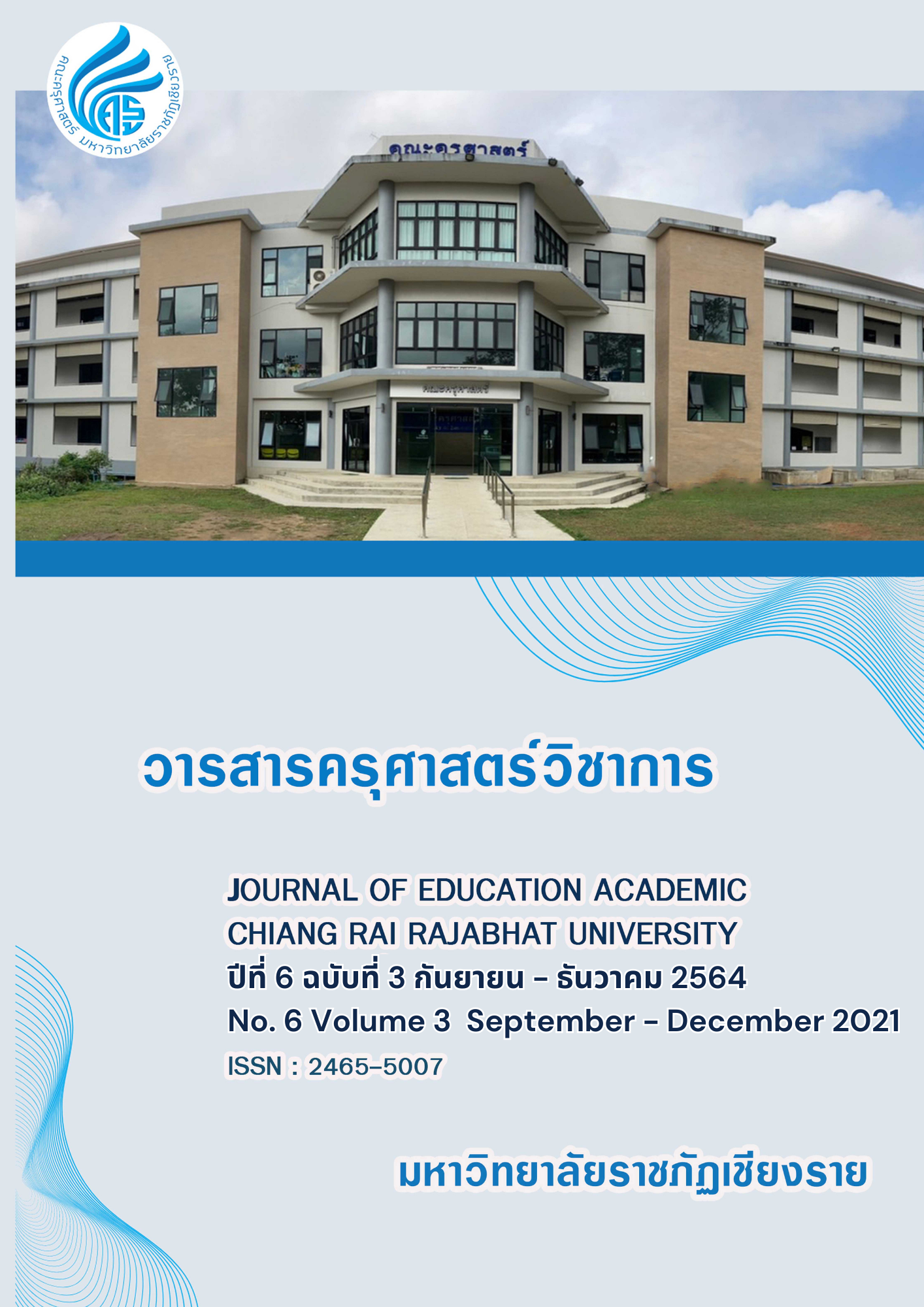The Guidelines for Participatory Administration of Anuban Mae Fah Luang School under Chiang Rai Primary Educational Service Area Office 3
Keywords:
Participation in Decision-making, Participation in implementation, Participation in benefits, Participation in EvaluationAbstract
The objectives of this study were: 1) to examine the participatory administration of Anuban Mae Fah Luang School under Chiang Rai Primary Educational Service Area Office 3; 2) to investigate the factors affecting participatory administration of Anuban Mae Fah Luang School under Chiang Rai Primary Educational Service Area Office 3; and 3) to develop the guidelines for participatory administration of Anuban Mae Fah Luang School under Chiang Rai Primary Educational Service Area Office 3. The population recruited 40 participants including school administrators and all teachers at this school, school committee members, parents representatives, community representatives. The research instruments were questionnaire, interview and focus-group discussion. The data was analyzed for frequency, percentage and content analysis.
The results showed that characteristics, factors and the guidelines developing participatory administration of Anuban Mae Fah Luang School under Chiang Rai Primary Educational Service Area Office 3 were proposed into 4 aspects.
- Decision-making: The school director shared high participation while parents and community representatives showed low participation. Internal Factors: School director, teachers, parents, school committee members, community representatives showed participation in regard to school administration and policy structure. External Factors: Community members, parents and local agencies showed participation in regard to the socio-cultural dimension of the school. The guidelines developing participatory administration of the school require appointing school committee members, sharing meetings, and publicly informing about school activities for each academic year.
- Implementation: School director showed high participation, while parents and community representatives showed low participation. Internal Factors: Parents, school committee members, community representatives shared participation in school service and learners characteristics. External Factors: Community representatives and external agencies sponsored technological supports to the school. The guidelines for participatory administration involved the roles of labor representatives and advisor to the school.
- Benefits: School director showed moderate participation, while parents and community representatives showed low participation. Internal Factors: Parents, school committee members, community representatives shared their roles on personnel, materials and equipment for the school. External Factors: Parents showed participation regarding school economy. The guidelines for participatory administration require fundraising, solving problems, and exchanging information with the school.
- Evaluation: School director showed moderate participation, while parents representatives showed low participation. Internal Factors: Teachers, educational personnel and parents shared their roles in school administration. External Factors: School director, teachers, parents, school committee members, community, and stakeholders shared their roles in policy and legislation of the school. The guidelines for participatory administration require building parents networking, co-analyzing and evaluating project designing, implemeing, and evaluating the outcome.
References
บุญชม ศรีสะอาด. (2556). การวิจัยเบื้องต้นฉบับปรับปรุงใหม่. กรุงเทพมหานคร: สุวีริยาสาส์น.
เมตต์ เมตการุณ์จิต. (2553). การบริหารจัดการศึกษาแบบมีส่วนร่วม. (พิมพ์ครั้งที่ 3). กรุงเทพมหานคร: บุ๊คพอยท์.
รัฐธรรมนูญแห่งราชอาณาจักรไทย มาตรา 65. (6 เมษายน 2560). ราชกิจจานุเบกษา. เล่มที่ 134. ตอนที่ 40 ก. หน้า 17.
โรงเรียนอนุบาลแม่ฟ้าหลวง. (2562). แผนปฏิบัติราชการปีการศึกษา 2562. เชียงราย: โรงเรียนอนุบาลแม่ฟ้าหลวง.
สราวดี เพ็งศรีโคตร. (2554). รูปแบบการมีส่วนร่วมของผู้ปกครองในการจัดการศึกษาปฐมวัย. วารสารการศึกษาและพัฒนาสังคม มหาวิทยาลัยบูรพา. 7(1), 75 - 79.
สำนักงานเลขาธิการสภาผู้แทนราษฎร. (2562). ความมุ่งหมายและคำอธิบายประกอบรายมาตราของรัฐธรรมนูญแห่งราชอาณาจักรไทย พุทธศักราช 2560. กรุงเทพมหานคร: สำนักงานฯ.
สำนักงานเลขานุการของคณะกรรมการยุทธศาสตร์ชาติ. (2561). ยุทธศาสตร์ชาติ พ.ศ. 2561–2580 (ฉบับย่อ). กรุงเทพมหานคร: สำนักงานฯ.
Cohen & Uphoff. (2011). Promoting Empowerment of People in Advancing Povert Eradication, Social Integration and Decent Work for All. Un HQ. June-July.
Downloads
Published
Issue
Section
License
Copyright (c) 2022 Journal of Education Academic Chiang Rai Rajabhat University

This work is licensed under a Creative Commons Attribution-NonCommercial-NoDerivatives 4.0 International License.






